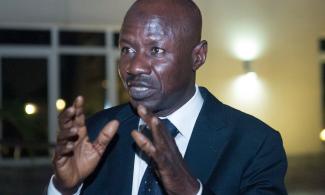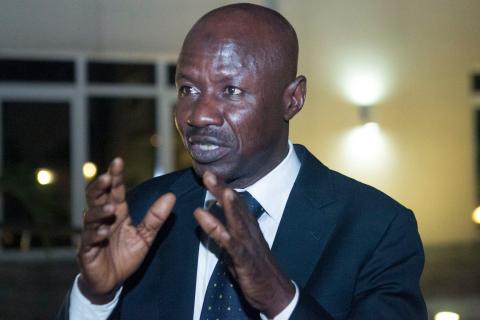
The acting chairman of the Economic and Financial Crimes Commission, Ibrahim Magu, has defended the agency’s N24 billion new office, brushing aside criticisms about the huge cost, and claiming it is a modest amount for a building that should cost N100 billion.
The acting chairman of the Economic and Financial Crimes Commission, Ibrahim Magu, has defended the agency’s N24 billion new office, brushing aside criticisms about the huge cost, and claiming it is a modest amount for a building that should cost N100 billion.
A visibly angry Mr. Magu on Wednesday took strong exception to the scrutiny that followed the EFCC’s completion of the new headquarters in Abuja.
The 10-floor building is about 95 percent completed as at May 9 and is expected to serve as the operating base for the anti-graft body.
Politicians have hailed the completion, but anti-corruption campaigners and other citizens are instead keeping their eyes on the cost, especially coming at a time that the agency itself is complaining of poor funding that hampers its basic operations.
“You are not being fair,” Mr. Magu said when asked by PREMIUM TIMES to respond to the controversies around the N24 billion price Wednesday. “If you go and bring any valuer, they will value it for not less than N100 billion.”
Mr. Magu took a select group of journalists on a tour of the building Wednesday afternoon, during which he took questions which were restricted to the new building. The anti-graft chief refused to take questions about his own activities or those of the EFCC in recent months.
The tour is part of ongoing efforts to raise public awareness to the building before formal opening by President Muhammadu Buhari on May 15.
He explained the cumbersome and expensive procurement process that culminated in the successful execution of the new head office, located at about 12 kilometers southwest of Abuja’s Central Business District.
“That shows prudence, that shows transparency,” Mr. Magu said.
Suspicions have escalated within the past two weeks when Mr. Magu began gloating about the building, which was built by the construction firm, Julius Berger.
The acting EFCC chairman told The Nation last month he was “excited that the headquarters is ready for use” and placed it at an offhand price of N24 billion.
“I will crosscheck to give you the exact figure,” he added.
The skepticism that ensued following the revelation last month gained traction online Tuesday after the Senate President, Bukola Saraki, led other lawmakers on a tour of the facility.
Mr. Saraki praised Mr. Magu and his last two predecessors for putting in their best to complete the building for the agency, which was established in 2003.
[Acting EFCC Chairman, Ibrahim Magu]
The agency has been renting offices and official quarters for most of its staff at its branches across the country, including in Abuja where hundreds are currently putting up in a rented apartment.
On November 24, 2010, Yayale Ahmed, then Secretary to the Government of the Federation, proposed the new building to the Federal Executive Council and later got an initial release of N18 billion for it.
A few weeks later, Sahara Reporters published concerns about how Julius Berger won a ‘no objection’ procurement certificate to build the office, alongside a slew of other allegedly questionable contracts award by President Goodluck Jonathan’s cabinet at the time.
The new office includes a mid-size parking facility, three detached buildings, including a clinic, a generator house, and a 33KV step-down transformer station.
Martin Obono, an Abuja-based anti-corruption campaigner, said the EFCC has no justification for spending N24 billion on a single office at the expense of not only the taxpayers but also some of its staff.
“It is not feasible that N24 billion would have been spent on that building,” Mr. Obono said. “It is too expensive for a so-called anti-corruption agency.”
Mr. Obono said the EFCC could build a befitting office for its operations in each of the 36 states at the price of N24 billion, especially since hundreds of staff members operating away from the head office in Abuja would still be putting up with offices that are not conducive.
“Over the past few months, we have heard the EFCC raise alarm about how poor funding is hindering its operations,” Mr. Obono said. “So why should the same agency spend such a humongous amount on an office complex that would only occupy a few people.”
Several departments and directorates are expected to be moved to the new office, but several others will not have accommodation.
Mr. Magu confirmed this and said the EFCC would still keep its current head office along Adetokunbo Ademola Crescent in Wuse II as an annex. Furthermore, some Abuja-based staff members who are currently working out of leased buildings and living in rented quarters would continue to do so for the near future because the new building cannot accommodate everyone.
“Clearly, this building cannot return the N24 billion value Nigerians paid for it,” Mr. Obono said. “We cannot use corruption to fight corruption.”
He demanded that the EFCC publish its books in relations to the building, especially procurement dossiers.
“Mr. Magu must publish the full details of how the money was spent and not think Nigerians are foolish or that they are not paying attention to the suspicious activities going on in an agency that should be curbing financial crimes,” the activist added.
